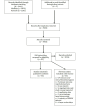The potential of technology-based psychological interventions for anorexia and bulimia nervosa: a systematic review and recommendations for future research
- PMID: 25840591
- PMCID: PMC4397416
- DOI: 10.2196/jmir.3554
The potential of technology-based psychological interventions for anorexia and bulimia nervosa: a systematic review and recommendations for future research
Abstract
Background: Previous studies have shown an unmet need in the treatment of eating disorders. In the last decade, interest in technology-based interventions (TBIs) (including computer- and Internet-based interventions [CBIs] or mobile interventions) for providing evidence-based therapies to individuals with different mental disorders has increased.
Objective: The aim of this review was to systematically evaluate the potential of TBIs in the field of eating disorders, namely for anorexia nervosa (AN) and bulimia nervosa (BN), for both prevention and treatment, and also for carers of eating disorder patients.
Methods: A systematic literature search was conducted using Medline and PsycINFO. Bibliographies of retrieved articles were also reviewed without date or study type restrictions.
Results: Forty studies resulting in 45 publications reporting outcomes fulfilled the inclusion criteria: 22 randomized controlled trials, 2 controlled studies, and 16 uncontrolled studies. In total, 3646 patients were included. Overall, the studies provided evidence for the efficacy of guided CBIs, especially for BN patients and for compliant patients. Furthermore, videoconferencing also appeared to be a promising approach. Evaluation results of Internet-based prevention of eating disorders and Internet-based programs for carers of eating disorder patients were also encouraging. Finally, there was preliminary evidence for the efficacy of mobile interventions.
Conclusions: TBIs may be an additional way of delivering evidence-based treatments to eating disorder patients and their use is likely to increase in the near future. TBIs may also be considered for the prevention of eating disorders and to support carers of eating disorder patients. Areas of future research and important issues such as guidance, therapeutic alliance, and dissemination are discussed.
Keywords: Internet; anorexia nervosa; bulimia nervosa; cognitive behavioral therapy; computers; mobile phone.
Conflict of interest statement
Conflicts of Interest: None declared.
Figures
Similar articles
-
Moderators and mediators of outcome in treatments for anorexia nervosa and bulimia nervosa in adolescents: A systematic review of randomized controlled trials.Int J Eat Disord. 2020 Jan;53(1):3-19. doi: 10.1002/eat.23159. Epub 2019 Sep 11. Int J Eat Disord. 2020. PMID: 31506978
-
Participation and outcome in manualized self-help for bulimia nervosa and binge eating disorder - a systematic review and metaregression analysis.Clin Psychol Rev. 2014 Mar;34(2):158-76. doi: 10.1016/j.cpr.2014.01.003. Epub 2014 Jan 23. Clin Psychol Rev. 2014. PMID: 24508686 Review.
-
Effectiveness of a web-based treatment program using intensive therapeutic support for female patients with bulimia nervosa, binge eating disorder and eating disorders not otherwise specified: study protocol of a randomized controlled trial.BMC Psychiatry. 2013 Nov 16;13:310. doi: 10.1186/1471-244X-13-310. BMC Psychiatry. 2013. PMID: 24238630 Free PMC article. Clinical Trial.
-
The Efficacy of Psychological Therapies in Reducing Weight and Binge Eating in People with Bulimia Nervosa and Binge Eating Disorder Who Are Overweight or Obese-A Critical Synthesis and Meta-Analyses.Nutrients. 2017 Mar 17;9(3):299. doi: 10.3390/nu9030299. Nutrients. 2017. PMID: 28304341 Free PMC article. Review.
-
[E-Therapies for Anorexia Nervosa, Bulimia Nervosa and Binge Eating Disorder].Praxis (Bern 1994). 2019;108(14):911-915. doi: 10.1024/1661-8157/a003350. Praxis (Bern 1994). 2019. PMID: 31662114 German.
Cited by
-
Therapeutic Alliance in Web-Based Treatment for Eating Disorders: Secondary Analysis of a Randomized Controlled Trial.JMIR Form Res. 2022 Jun 30;6(6):e33813. doi: 10.2196/33813. JMIR Form Res. 2022. PMID: 35771608 Free PMC article.
-
The use of technology in the treatment of youth with eating disorders: A scoping review.J Eat Disord. 2022 Nov 24;10(1):182. doi: 10.1186/s40337-022-00697-5. J Eat Disord. 2022. PMID: 36434657 Free PMC article. Review.
-
Psychotherapies for eating disorders: findings from a rapid review.J Eat Disord. 2023 Oct 4;11(1):175. doi: 10.1186/s40337-023-00886-w. J Eat Disord. 2023. PMID: 37794513 Free PMC article. Review.
-
Smartphone application for adolescents with anorexia nervosa: an initial acceptability and user experience evaluation.BMC Psychiatry. 2021 Sep 25;21(1):467. doi: 10.1186/s12888-021-03478-7. BMC Psychiatry. 2021. PMID: 34563166 Free PMC article.
-
Use of Telehealth in the Management of Adolescent Eating Disorders: Patient Perspectives and Future Directions Suggested from the COVID-19 Pandemic.Adolesc Health Med Ther. 2022 Apr 4;13:45-53. doi: 10.2147/AHMT.S334977. eCollection 2022. Adolesc Health Med Ther. 2022. PMID: 35401019 Free PMC article. Review.
References
-
- American Psychiatric Association . Practice Guideline for the Treatment of Patients with Eating Disorders. 3rd edition. Washington, DC: American Psychiatric Association; 2006.
-
- National Collaborating Centre for Mental Health . Eating Disorders: Core Interventions in the Treatment and Management of Anorexia Nervosa, Bulimia Nervosa and Related Eating Disorders. London: The British Psychological Society and the Royal College of Psychiatrists; 2004. - PubMed
Publication types
MeSH terms
LinkOut - more resources
Full Text Sources
Other Literature Sources


